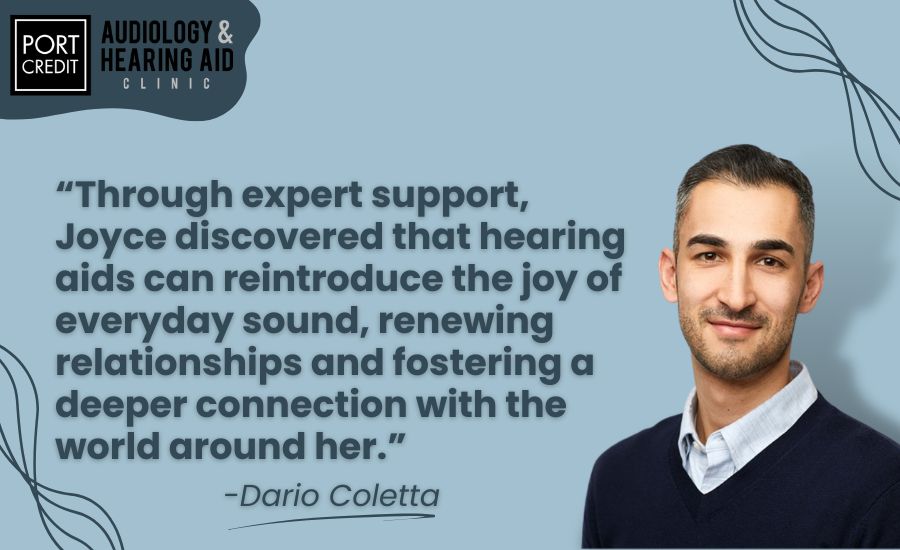Don’t Shrug Your Shoulders at Sudden Hearing Loss
May 9, 2024
Typically, everyone's hearing declines as they age, and many people have one ear that hears better than the other. Individuals who work in high-noise environments or are regularly exposed to loud noise can also expect to experience hearing loss.
However, if you suddenly experience hearing loss in one ear for no apparent reason it is a cause for concern. Sudden sensorineural hearing loss (SSHL), or sudden deafness, is a type of nerve deafness that can potentially lead to permanent hearing loss. A SSHL is considered a medical emergency.
According to a 2017 article in the Canadian Medical Association Journal (citation), “the incidence of sudden sensorineural hearing loss is estimated between 5 and 20 cases per 100 000 people?. Men and women are equally at risk and all age groups can be affected; however, patients in their 40s and 50s make up the most affected age range.”
The incidence of SSHL is probably underdiagnosed because most people don’t take it seriously, but shrugging your shoulders at SSHL can result in permanent, irreversible hearing loss.
With sudden hearing loss it is critical that you seek treatment within 72 hours from the onset of symptoms. Since there is a severe lack of education about the dangers of sudden hearing loss, our blog this month focuses on improving your hearing health awareness by answering some fundamental questions about SSHL.
What Is Sudden Hearing Loss?
Sudden sensorineural hearing loss is a rapid and unexplained hearing loss that occurs acutely over 72 hours and is usually unilateral, meaning in one ear. The disturbance is thought to originate in the cochlea or acoustic nerve.
The pathophysiology or cause of sudden sensorineural hearing loss is unknown. Research suggests a variety of reasons, including: a viral infection, an immune system malfunction, an inflammatory injury to the ear, blocked blood flow to the ear, or some combination of these.
SSHL can make you unsteady on your feet, increasing your risk of falling.
What Are the Symptoms of SSHL?
A sudden, inexplicable loss of hearing in one ear. You may hear a "pop" before you begin to experience hearing challenges and/or feel like your ear is plugged . Additional symptoms can include vertigo or dizziness and tinnitus.
Your hearing may go away all at once, like a water pipe bursting , or it may be a gradual decline over a few minutes or hours, like a slow leak.
What Are Some Common Mistakes Related to SSHL?
Sudden hearing loss is often ignored because the symptoms feel familiar, like a head cold, earwax, or water in the ear. Consequently, those experiencing it go to a pharmacy to get an earwax removal kit or an antihistamine for congestion.
Many physicians do not realize that a SSHL has occurred and assume it’s an ear infection. However, if you don’t have a history of ear infections, the sudden appearance of one is very rare.
If you initially assume earwax buildup is the cause and apply oil or drops to soften and remove the earwax but do not notice any change, then you need to contact us for an evaluation of your condition ASAP.
A Quick Self-Test for Sudden Hearing Loss
Harvard Health provides a quick self-test to help you distinguish between normal stuffiness and SSHL:
Hum aloud to yourself. With normal hearing, you hear the sound equally in both ears. If you do this when you have a sudden loss of hearing in one ear, the humming will shift to one side over the other.
For example, if your right ear is affected and the hum is louder in that ear, then the hearing loss is more likely a conductive loss, and probably due to blockage from a cold or built-up earwax. (You can simulate this effect by humming while you cover your right ear.)
However, if the humming is louder in the left ear, it suggests the hearing loss in the right ear is likely due to recent nerve damage, and requires prompt attention.
How Is Sudden Hearing Loss Diagnosed?
A comprehensive hearing assessment is used to diagnose SSHL. Your Audiologist will begin to narrow down the possible causes of your hearing loss during your initial interview by asking about additional symptoms, your family history, and your medical history
As we physically examine your ears, we will be able to determine if some foreign object is blocking your ear canal, if you have built-up earwax, or if there is fluid/swelling from an infection.
Your audiogram will confirm the nature and degree of the hearing loss you are experiencing and will serve as the baseline for comparison following treatment. If you test your hearing regularly as part of your health regimen, we could also compare the change to your typical hearing test results.
How Is Sudden Hearing Loss Treated?
It is critical to understand that you need to schedule a hearing assessment within 72 hours of the onset of symptoms to get your treatment started early and have the best odds for recovery.
Full recovery from mild SSNHL is possible if treated within a 10-to-14-day window. However, total recovery in moderate to severe cases of SSHL only occurs in about 20 percent of cases, even with prompt treatment.
Treatment typically includes the use of oral corticosteroids, like prednisone, or the injection of corticosteroids through the eardrum.
Don’t Shrug Off SHL: Seek Professional Help
Because there is a narrow window for catching and treating sudden hearing loss, it is critical to contact a hearing care professional within 72 hours of the onset of symptoms.
Don’t shrug off sudden hearing loss; contact Port Credit Audiology & Hearing Aid Clinic for the professional help you need in order to prevent permanent hearing loss. Every day you delay reduces your chance of a successful recovery.
If you suspect sudden hearing, loss it’s better to be safe than sorry. Schedule a hearing assessment ASAP or give us a call at (905) 990-3755.




